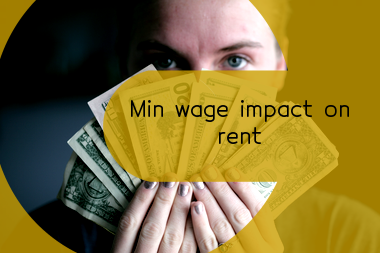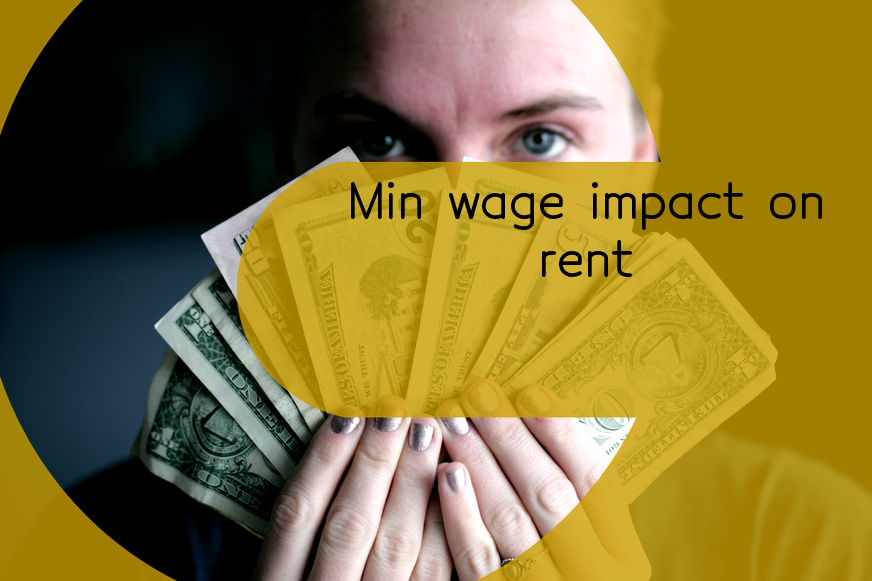Minimum wage can indirectly affect rent prices by influencing the cost of living and demand for housing. When the minimum wage increases, it can improve the purchasing power of low-income earners, giving them more spending power. This can increase the demand for certain goods and services, including housing, which can lead to an increase in rental prices.
At the same time, an increase in minimum wage can also increase the cost of labor for businesses, which may lead to increased expenses and ultimately higher prices for goods and services. These higher prices can increase the cost of living, including housing, making it more difficult for low-income earners to afford secure housing.
On the other hand, if the minimum wage decreases, it can lead to a reduction in the demand for housing, and this can lower rent prices. A decrease in minimum wage may also lower the cost of labor for businesses, resulting in lower prices for goods and services, including housing.
Overall, minimum wage can have an indirect effect on rent prices by influencing the purchasing power and spending patterns of low-income earners, as well as the overall cost of living and demand for housing.
Overview of minimum wage in the United States
Minimum wage in the United States is the lowest hourly wage that an employer can legally pay to their employees. This amount is set by federal law and is adjusted periodically to keep up with inflation and changes in the economy. As of July 24, 2009, the federal minimum wage is $7.25 per hour, although some states and localities have their own higher minimum wage rates.
The federal minimum wage was first established by the Fair Labor Standards Act (FLSA) in 1938. At that time, it was set at 25 cents per hour, which was equivalent to approximately $4.54 in today's dollars. Since then, the minimum wage has been raised numerous times, with the most recent increase occurring in 2009.
Despite these increases, the current federal minimum wage is still considered by many to be insufficient to provide a living wage for many Americans. Advocates for a higher minimum wage argue that it would help to reduce poverty and improve living standards for low-income workers and their families.
Opponents of a higher minimum wage argue that it would increase labor costs for employers, which could lead to higher prices for consumers and layoffs for workers. They also argue that minimum wage jobs are often entry-level positions that are meant to provide valuable job experience and skill development, rather than long-term careers with high salaries.
Overall, the minimum wage remains a contentious issue in the United States, with arguments on both sides of the debate.
How a higher minimum wage affects the ability to pay rent
A higher minimum wage can have a positive impact on the ability to pay rent for those earning the minimum wage or close to it. If the minimum wage is increased, employees will earn more money per hour, which can lead to an increase in their overall income. This increase in income can make it easier to afford rent, especially in areas where housing costs are high.
However, if the increases in costs of goods and services compensate the increase of minimum wage, the impact may be less noticeable. Additionally, landlords may raise rent prices in response to an increased minimum wage, which could offset any gains in income.
Overall, while a higher minimum wage can potentially help individuals pay for rent, there are a variety of factors that can impact the ability of low income families to afford housing.
How to raise the rent when the minimum wage increases
- 1Check the local laws and regulations pertaining to rent increases and minimum wage changes. Make sure that the rent increase is legal and compliant with the applicable regulations.
- 2Determine an appropriate and reasonable percentage increase for the rent based on the minimum wage increase. This increase should cover the additional costs associated with providing housing to tenants, such as utilities, insurance, and maintenance.
- 3Inform the tenants of the planned rent increase well in advance. Typically, landlords need to provide at least 30 days of written notice before raising the rent.
- 4Explain the reason for the rent increase to the tenants. Emphasize that it is due to the rising costs of living and providing housing to tenants, not as an opportunistic move to take advantage of the minimum wage increase.
- 5Consider offering alternative payment arrangements for tenants who may struggle with the rent increase. For example, offering a payment plan or a temporary grace period can help make the transition easier for tenants.
- 6Communicate with tenants throughout the process and be open to feedback or questions they may have. By maintaining open communication, you can avoid any miscommunication or misunderstandings that could sour the landlord-tenant relationship.
Closing thoughts
The relationship between minimum wage and rent prices is complex and multifaceted. While increasing the minimum wage may appear to lead to higher rent prices in some instances, it ultimately depends on a variety of factors such as overall economic conditions, the local housing market, and the type of housing available. However, many experts agree that simply raising the minimum wage will not solve the affordable housing crisis, and that comprehensive policy solutions are needed to address the underlying issues of income inequality and lack of affordable housing. Ultimately, it is important to approach the issue of minimum wage and rent prices with a nuanced and comprehensive perspective.
Just one more thing: if you liked the article, please like us on social media and share this article with friends.



